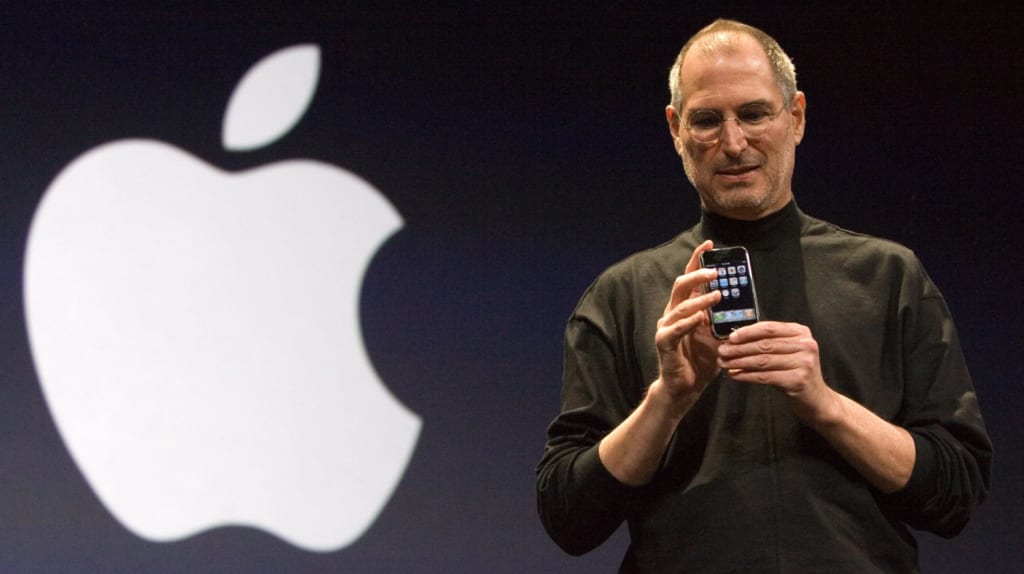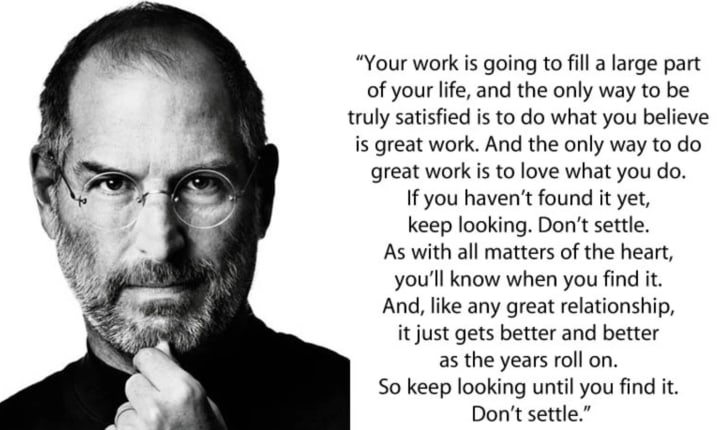
Introduction
Steve Jobs was a visionary entrepreneur, inventor, and co-founder of Apple Inc. He was widely regarded as a pioneer of the personal computer revolution and a master of innovation, design, and marketing. With his relentless pursuit of perfection and his ability to inspire and motivate others, Jobs transformed Apple into one of the most successful and influential companies in the world.
Throughout his life, Jobs was known for his unconventional approach to business and his uncompromising commitment to quality. He was a true maverick who challenged conventional wisdom and pushed the boundaries of what was possible. Jobs' influence on the technology industry was profound and far-reaching, and his legacy continues to be felt today.
This article will provide an overview of Steve Jobs' life, career, and contributions, highlighting his early years, his role in the founding of Apple, his departure and subsequent return to the company, and his key contributions to the technology industry. Additionally, this article will explore Jobs' personal life, his philanthropic activities, and his controversies and criticisms. Ultimately, this article aims to offer insights into the life and legacy of one of the most iconic figures in the history of technology.
Early Life and Education of Steve Jobs
Steve Jobs was born on February 24, 1955, in San Francisco, California, to Joanne Schieble and Abdulfattah Jandali. However, he was adopted at birth by Paul and Clara Jobs, who raised him in Mountain View, California.
As a child, Jobs showed an early interest in electronics and technology. He would spend hours tinkering with electronics and gadgets in his family's garage. He was also known to be a mischievous child, often causing trouble at school and challenging authority.
Jobs attended Homestead High School in Cupertino, California, where he met Steve Wozniak, who would later become his co-founder at Apple. After high school, Jobs enrolled at Reed College in Portland, Oregon, but dropped out after just one semester. However, he continued to audit classes and was known to sleep on friends' floors and return bottles for money.
Jobs' interest in technology and his entrepreneurial spirit led him to take a job at Atari, a pioneering video game company. This experience gave him a taste of the business world and inspired him to pursue his own ventures.
Career of Steve Jobs
A. Founding of Apple Inc.
In 1976, Jobs and Wozniak founded Apple Computer Inc. in the garage of Jobs' family home in Los Altos, California. They started by selling computer kits, which were essentially a collection of components that customers could assemble into their own personal computers. Jobs and Wozniak later designed and launched the Apple I, the company's first fully assembled personal computer.
Under Jobs' leadership, Apple quickly became a leading player in the personal computer market. The company's success was driven in part by its innovative products, such as the Apple II, which was one of the first personal computers to feature a color display and support for floppy disks.
B. Departure from Apple and founding of NeXT
Despite Apple's early success, Jobs was eventually forced out of the company in 1985 after a power struggle with CEO John Sculley. Jobs then founded NeXT Computer, a company that produced high-end, high-priced computers for the education and business markets.
While NeXT Computer did not achieve the same level of success as Apple, the company's technology and software played an important role in the development of the World Wide Web. Tim Berners-Lee, the inventor of the Web, used a NeXT Computer to develop the first Web server and browser.
C. Return to Apple and success of the company
In 1997, Apple acquired NeXT Computer, and Jobs returned to the company as CEO. He quickly set about revitalizing the struggling company by focusing on innovation, design, and customer experience. Under his leadership, Apple launched a series of groundbreaking products, including the iMac, iPod, iPhone, and iPad.
Jobs' emphasis on design and user experience helped to differentiate Apple's products from those of its competitors, and the company's success grew rapidly. By the time of Jobs' death in 2011, Apple was one of the most valuable companies in the world, and its products had become an integral part of modern life.
Key Contributions of Steve Jobs
A. Innovation and Design
Steve Jobs was known for his innovative and visionary approach to technology and design. He was deeply committed to creating products that were both beautiful and functional, and he believed that technology should be intuitive and accessible to everyone.
Jobs was directly involved in the design of many of Apple's most iconic products, including the Macintosh, iPod, iPhone, and iPad. His focus on design and user experience helped to set Apple's products apart from those of its competitors and created a new standard for consumer electronics.
B. Marketing and Branding
In addition to his contributions to innovation and design, Jobs was also a master of marketing and branding. He had a keen understanding of what consumers wanted and was able to create products and marketing campaigns that resonated with them.
Jobs was particularly skilled at creating hype around new products, using a combination of secrecy and carefully orchestrated product launches to build anticipation and excitement. He was also known for his ability to communicate the value of Apple's products to consumers, using simple, clear messaging that emphasized the user experience.
C. Impact on the Technology Industry
Steve Jobs' contributions to the technology industry were profound and far-reaching. He played a central role in the development of the personal computer, the graphical user interface, and the modern smartphone and tablet.
Jobs' focus on design, user experience, and innovation helped to push the technology industry forward and set new standards for product development. His influence can be seen in the products and services that we use every day, from smartphones and tablets to music streaming and social media.
D. Philanthropic Activities
Although Steve Jobs was known primarily for his business success and contributions to technology, he was also involved in a number of philanthropic activities. He supported a range of causes, including education, environmental conservation, and healthcare.
Jobs also founded the charity organization Apple Giving, which donated money to a variety of non-profit organizations. Additionally, he was known for his personal generosity, including donations to cancer research and treatment organizations.
E. Controversies and Criticisms
While Steve Jobs' contributions to the technology industry are widely acknowledged, he was not without his controversies and criticisms. Some have criticized his management style, which was known for being demanding and sometimes abrasive.
Jobs was also criticized for his company's labor practices, including its use of overseas factories with poor working conditions. Additionally, some have questioned the environmental impact of Apple's products and criticized the company's reluctance to adopt more sustainable practices.
Despite these criticisms, Steve Jobs' legacy remains an important and influential one. His contributions to technology, design, and marketing have had a lasting impact on the industry, and his focus on innovation and user experience continue to shape the products and services we use today.
Personal Life of Steve Jobs
A. Family and Relationships
Steve Jobs was married to Laurene Powell Jobs, whom he met while speaking at a Stanford business school event. The couple had three children together, and Jobs also had a daughter, Lisa Brennan-Jobs, from a previous relationship.
Jobs was known for being a private person when it came to his personal life, and little is known about his relationships outside of his immediate family.
B. Health Issues and Cancer Diagnosis
In 2003, Jobs was diagnosed with pancreatic cancer, a disease that would ultimately take his life. He initially chose to pursue alternative therapies rather than traditional medical treatment, which drew criticism from some in the medical community.
Jobs later underwent a liver transplant in 2009, and his health continued to be a concern in the years leading up to his death.
C. Personality and Character Traits
Steve Jobs was known for his charismatic personality and intense focus. He was also known for being demanding and sometimes difficult to work with, with a reputation for being uncompromising in his pursuit of perfection.
Despite these traits, Jobs was also known for his creativity, vision, and ability to inspire those around him. He was deeply committed to his work and believed that technology could be a force for positive change in the world.
D. Hobbies and Interests
Outside of his work at Apple, Steve Jobs had a number of hobbies and interests. He was a fan of music and was known for his love of the Beatles in particular. He also had a strong interest in design and architecture, and was involved in the design of Apple's corporate headquarters in Cupertino, California.
Jobs was also known for his interest in Eastern spirituality and meditation, and he often traveled to India in search of spiritual enlightenment. These interests would later influence his personal and professional philosophy, including his emphasis on simplicity and mindfulness in product design.
E. Death and Legacy
Steve Jobs died on October 5, 2011, at the age of 56. His death was widely mourned, and tributes poured in from around the world.
Despite his sometimes controversial personal and professional life, Jobs' legacy as an innovator and visionary remains an important one. His contributions to technology, design, and marketing continue to shape the industry today, and his focus on innovation and user experience continue to inspire entrepreneurs and innovators around the world.
Controversies and Criticisms of Steve Jobs
A. Management Style
Steve Jobs was known for his demanding and sometimes abrasive management style. He had a reputation for being a perfectionist, and he was not afraid to criticize or even fire employees who did not meet his expectations.
While some saw this management style as a necessary part of his success, others criticized Jobs for creating a toxic work environment that was detrimental to the mental health and wellbeing of his employees.
B. Labor Practices
Apple has been criticized for its labor practices, particularly in its overseas factories. Some have accused the company of exploiting workers in countries like China, where working conditions can be poor and wages low.
Critics argue that Steve Jobs was aware of these issues and did not do enough to address them during his tenure at Apple.
C. Environmental Impact
Apple has also been criticized for its environmental impact, particularly in relation to the manufacturing and disposal of its products. Some have argued that the company could do more to reduce its carbon footprint and adopt more sustainable practices.
Critics have accused Steve Jobs of being indifferent to these issues and prioritizing profits over environmental concerns.
D. Antitrust Concerns
Apple has faced a number of antitrust concerns over the years, particularly in relation to its App Store. Some have argued that the company's control over the App Store and its 30% commission on app sales gives it too much power and stifles competition.
Critics have accused Steve Jobs of being overly protective of the Apple ecosystem and of using the company's dominance in the smartphone market to unfairly advantage Apple's own products and services.
E. Personal Life and Character
Steve Jobs was not without his personal controversies and criticisms. Some have criticized his handling of the situation with his daughter Lisa, whom he initially denied paternity of.
Jobs was also known for being a difficult and demanding person to work with, and some have accused him of being selfish and egotistical.
Despite these controversies and criticisms, Steve Jobs' impact on the technology industry and his legacy as an innovator and visionary continue to be celebrated by many.
Conclusion
Steve Jobs was a complex and controversial figure, known for his innovative contributions to the technology industry as well as his demanding management style and personal controversies. From his early days as a college dropout tinkering with computers to his role as the co-founder and CEO of Apple, Jobs left an indelible mark on the world of technology and business.
His contributions to the development of personal computers, smartphones, and other digital devices have revolutionized the way we live and work. Jobs was also known for his emphasis on design and user experience, and his focus on creating products that were both functional and beautiful has set a standard for the industry.
Despite his controversies and criticisms, Jobs' legacy continues to inspire entrepreneurs and innovators around the world. His relentless pursuit of innovation and his commitment to excellence have left a lasting impact on the technology industry, and his vision for the future of technology continues to shape our world today.
Lastly i wanna end this off with a quote from him that i have kept in my heart throughout my life that gave me the courage to continue to pursue my passion as a writer.

About the Creator
Samuel
I write about Science/Tech/Business & Anything that can give value to people ❤️
I'm on YouTube too guys feel free to check out my channel here: www.youtube.com/@sambladeco






Comments
There are no comments for this story
Be the first to respond and start the conversation.